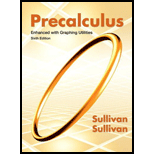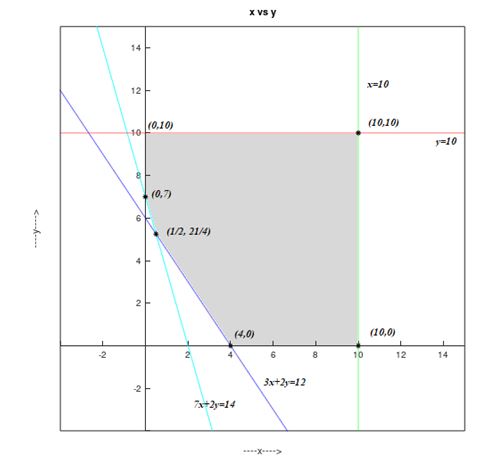
Production Scheduling In a factory, machine 1 produces 8-inch (in.) pliers at the rate of 60 units per hour (h) and 6-in. pliers at the rate of 70 units/h. Machine 2 produces 8-in. pliers at the rate of 40 units/h and 6-in. pliers at the rate of 20 units/h. It costs to operate machine 1, and machine 2 costs to operate. The production schedule requires that at least 240 units of 8-in. pliers and at least 140 units of 6-in. pliers be produced during each 10-h day. Which combination of machines will cost the least money to operate?
To solve: The given linear programming problem.
Answer to Problem 24AYU
Solution:
The minimum expense is when Machine 1 is operated for 30 minutes and machine 2 is operated for 5 hours and 15 minutes.
Explanation of Solution
Given:
| Machine | 8 inch pliers | 6 inch pliers | Cost of operation |
| 1 | 60 units/hour | 70 units/hour | |
| 2 | 40 units/hour | 20 units/hour |
In 10 hours of production schedule requires atleast, 240 units of 8 inch pliers and 140 units of 6 inch pliers.
Calculation:
Begin by assigning symbols for the two variables.
Number of hours Machine 1 operates.
Number of hours Machine 2 operates.
a. If is the total cost of operating the two machines, then
The goal is to minimize subject to certain constraints on and . Because and represents time, the only meaningful values of and are non-negative.
Therefore, .
From the given data we get
Therefore, the linear programming problem may be stated as
Minimize,
Subject to
The graph of the constraints is illustrated in the figure below.

| Corner points are | Value of objective function |
| 300 | |
| 210 | |
| 200 | |
| 500 | |
| 800 |
The minimum expense is when Machine 1 is operated for 30 minutes and machine 2 is operated for 5 hours and 15 minutes.
Chapter 11 Solutions
Precalculus Enhanced with Graphing Utilities
Additional Math Textbook Solutions
Elementary Statistics: Picturing the World (7th Edition)
A Problem Solving Approach To Mathematics For Elementary School Teachers (13th Edition)
Algebra and Trigonometry (6th Edition)
Calculus: Early Transcendentals (2nd Edition)
Elementary Statistics (13th Edition)
Calculus for Business, Economics, Life Sciences, and Social Sciences (14th Edition)
- Please find all values of x.arrow_forward3. Consider the initial value problem 9y" +12y' + 4y = 0, y(0) = a>0: y′(0) = −1. Solve the problem and find the value of a such that the solution of the initial value problem is always positive.arrow_forward5. Euler's equation. Determine the values of a for which all solutions of the equation 5 x²y" + axy' + y = 0 that have the form (A + B log x) x* or Ax¹¹ + Bä” tend to zero as a approaches 0.arrow_forward
- 4. Problem on variable change. The purpose of this problem is to perform an appropriate change of variables in order to reduce the problem to a second-order equation with constant coefficients. ty" + (t² − 1)y'′ + t³y = 0, 0arrow_forward4. Some psychologists contend that the number of facts of a certain type that are remembered after t hours is given by f(t)== 90t 951-90 Find the rate at which the number of facts remembered is changing after 1 hour and after 10 hours. Interpret.arrow_forward12:05 MA S 58 58. If f(x) = ci.metaproxy.org 25 2xon [0, 10] and n is a positive integer, then there is some Riemann sum Sthat equals the exact area under the graph of ƒ from x = Oto x = 10. 59. If the area under the graph of fon [a, b] is equal to both the left sum L, and the right sum Rfor some positive integer n, then fis constant on [a, b]. 60. If ƒ is a decreasing function on [a, b], then the area under the graph of fis greater than the left sum Land less than the right sum R₂, for any positive integer n. Problems 61 and 62 refer to the following figure showing two parcels of land along a river: River Parcel 2 Parcel 1 h(x) 500 ft 1,000 ft. Figure for 61 and 62 61. You want to purchase both parcels of land shown in the figure and make a quick check on their combined area. There is no equation for the river frontage, so you use the average of the left and right sums of rectangles covering the area. The 1,000-foot baseline is divided into 10 equal parts. At the end of each…arrow_forwardIf a snowball melts so that its surface area decreases at a rate of 10 cm²/min, find the rate (in cm/min) at which the diameter decreases when the diameter is 12 cm. (Round your answer to three decimal places.) cm/minarrow_forward1) let X: N R be a sequence and let Y: N+R be the squence obtained from x by di scarding the first meN terms of x in other words Y(n) = x(m+h) then X converges to L If and only is y converges to L- 11) let Xn = cos(n) where nyo prove D2-1 that lim xn = 0 by def. h→00 ii) prove that for any irrational numbers ther exsist asquence of rational numbers (xn) converg to S.arrow_forward4.2 Product and Quotient Rules 1. 9(x)=125+1 y14+2 Use the product and/or quotient rule to find the derivative of each function. a. g(x)= b. y (2x-3)(x-1) c. y== 3x-4 √xarrow_forward4.2 Product and Quotient Rules 1. Use the product and/or quotient rule to find the derivative of each function. 2.5 a. g(x)=+1 y14+2 √x-1) b. y=(2x-3)(x-:arrow_forward3. The total profit (in dollars) from selling x watches is P(x)=0.52x²-0.0002x². Find and interpret the following. a) P(100) b) P'(100)arrow_forward3. Find the slope and the equation of the tangent line to the graph of the given function at the given value of x. -4 f(x)=x-x³;x=2arrow_forwardarrow_back_iosSEE MORE QUESTIONSarrow_forward_ios
 Calculus: Early TranscendentalsCalculusISBN:9781285741550Author:James StewartPublisher:Cengage Learning
Calculus: Early TranscendentalsCalculusISBN:9781285741550Author:James StewartPublisher:Cengage Learning Thomas' Calculus (14th Edition)CalculusISBN:9780134438986Author:Joel R. Hass, Christopher E. Heil, Maurice D. WeirPublisher:PEARSON
Thomas' Calculus (14th Edition)CalculusISBN:9780134438986Author:Joel R. Hass, Christopher E. Heil, Maurice D. WeirPublisher:PEARSON Calculus: Early Transcendentals (3rd Edition)CalculusISBN:9780134763644Author:William L. Briggs, Lyle Cochran, Bernard Gillett, Eric SchulzPublisher:PEARSON
Calculus: Early Transcendentals (3rd Edition)CalculusISBN:9780134763644Author:William L. Briggs, Lyle Cochran, Bernard Gillett, Eric SchulzPublisher:PEARSON Calculus: Early TranscendentalsCalculusISBN:9781319050740Author:Jon Rogawski, Colin Adams, Robert FranzosaPublisher:W. H. Freeman
Calculus: Early TranscendentalsCalculusISBN:9781319050740Author:Jon Rogawski, Colin Adams, Robert FranzosaPublisher:W. H. Freeman
 Calculus: Early Transcendental FunctionsCalculusISBN:9781337552516Author:Ron Larson, Bruce H. EdwardsPublisher:Cengage Learning
Calculus: Early Transcendental FunctionsCalculusISBN:9781337552516Author:Ron Larson, Bruce H. EdwardsPublisher:Cengage Learning





